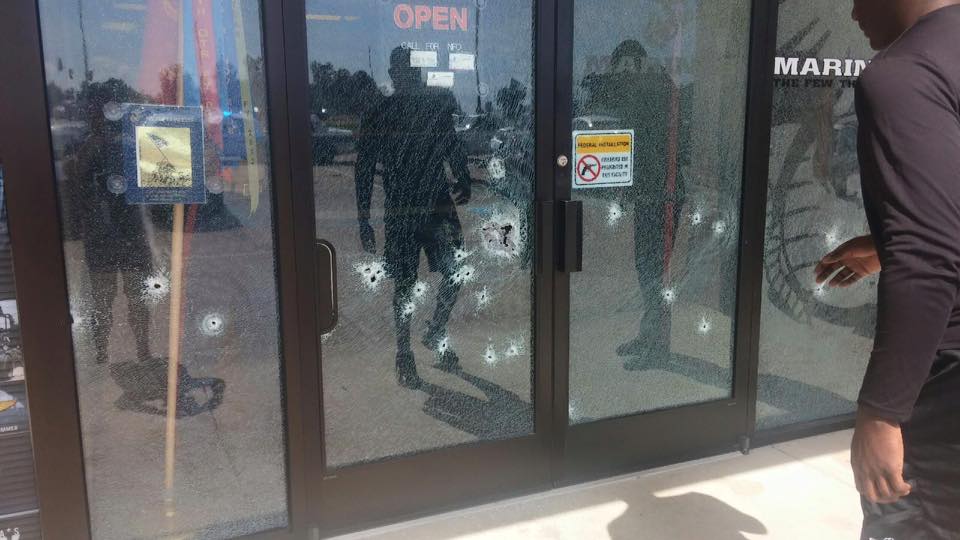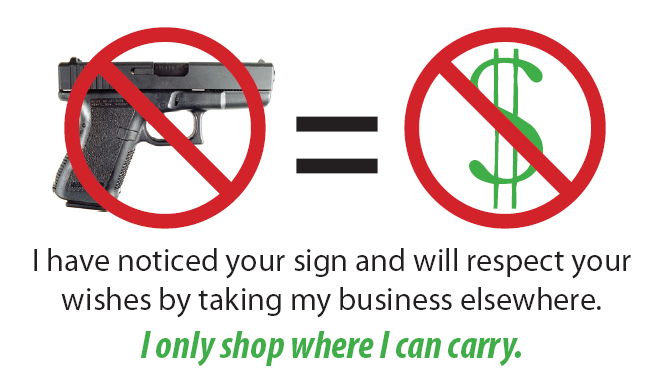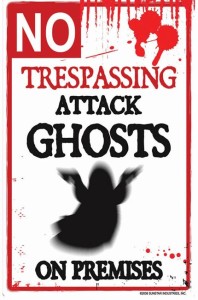Photo retrieved from Michael Ball’s Twitter page (@Mike_Ball423)
Our Pennsylvania Law Abiding Gun Owner (Penn LAGO) members often call and say “I have a License to Carry Firearms. Do I have to obey those ‘No Gun’ signs?”
This question has become more and more prominent with highly publicized shootings. Most recently ―and incredibly tragically― we witnessed the events in Chatanooga, Tennessee and Charleston, South Carolina. The Chatanooga shooting took place at a Navy recruiting base, where firearms are prohibited under federal law ― even for soldiers. Similarly, in South Carolina, firearms are prohibited in places of religious worship absent express permission from a church official or governing body with the authority to do so.
There are certain places where firearms are legally prohibited regardless of whether you have a License to Carry Firearms [for more on these locations, read our post Hot Zones: Where a Pennsylvania LAGO Can and Cannot Carry a Firearm]. In these locations, the “No Gun” signs put you on notice of the law, and those with a License to Carry Firearms must still obey the law.
Then there are private establishments. We’re talking about private businesses that aren’t off-limits under state or federal law. For instance, a coffee shop (there is no Pennsylvania or federal law prohibiting firearms in coffee shops). The remainder of this post will focus solely upon these kinds of places.
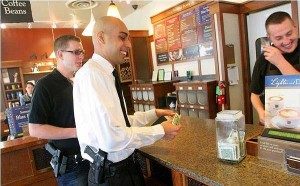
Retrieved from http://www.gunssavelife.com/wp-content/uploads/2014/06/Opencarrydoneright.jpg on 9/11/2015.
We’ve all seen private businesses with “No Gun” signs at the door. Some of them are so small and oddly placed that only a G.I. Joe action figure with superhuman vision would notice it. Others are prominently displayed and more likely to be seen by entering customers.
These policies may catch the attention of law-abiding gun owners and criminals alike. As Dr. John Lott pointed out in his article Did Colorado shooter single out Cinemark theater because it banned guns? there were seven movie theaters within twenty-minutes of the shooter’s home. The Colorado shooter did not choose the home closest to his residence. He did not choose the theater with the largest audience. He did, however, choose the only theater of the seven that had “No Gun” signs, proclaiming its policy to all of its visitors.
According to Dr. Lott, at the time the article was written:
With just one single exception, the attack in Tucson . . . every public shooting since at least 1950 in the U.S. in which more than three people have been killed has taken place where citizens are not allowed to carry guns.
So what is a Penn LAGO to do when a private business bears a “No Guns” sign?
Many of our members tell us “when I see a ‘No Gun’ sign, that place immediately loses my business.” And that is certainly the right of each and every American.
But what if a Penn LAGO finds himself in one of these places, having not known of the policy? And if he did see the sign, does that make it worse?
There are generally two sources of legal authority giving force to private businesses who prohibit firearms on their property.
The first source comes from state statutes that expressly give “No Gun” signs on private property the force of law.
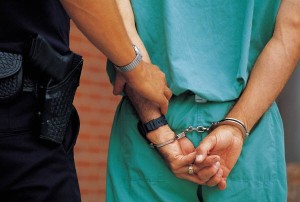 For example, in North Carolina, the law specifically states that:
For example, in North Carolina, the law specifically states that:
a permit does not authorize a person to carry a concealed handgun . . . [o]n any private premises where notice that carrying a concealed handgun is prohibited by the posting of a conspicuous notice or statement by the person in legal possession or control of the premises.
The law further provides that violators are guilty of a Class 1 misdemeanor.
With laws like this, the legislature grants the “No Gun” signs posted by private entities the force of law. In other words, entry in and of itself is a crime. If a concealed carry license holder chooses to ignore the “No Gun” sign at the coffee shop, he is simply breaking the law.
In Pennsylvania, we have no such law. There is no statute specifically granting those “No Gun” signs posted by private businesses the force of law. The legislature has not specifically deemed entering an establishment with a posted “No Gun” policy a criminal act.
But then there is the second source of legal authority allowing private businesses to prohibit firearms on their property: the laws of trespass.
At the outset, one thing is clear. Whether or not a “No Gun” sign is posted, a private property owner has the right to have his or her own policies. This includes policies that exclude firearms from his or her premises. Whether or not the owner can really achieve that goal by simply having policy is an entirely different matter, but that is for a different conversation.
So let’s suppose Larry the LAGO walks into a new grocery store. There are no signs posted on the door noting a “No Gun” policy. If there are, they must be very small and inconspicuous, because Larry ―who makes it a point to be aware of his surroundings― doesn’t notice them. As Larry is shopping, he bends over to the bottom shelf to grab a can of baked beans. The manager of the store happens to be walking by, and notices Larry’s CZ P-09 protruding from underneath his shirt. Mr. Manager approaches Larry and tells him “Excuse me sir, at this store we have a ‘no guns’ policy. I’m going to have to ask you to leave the store.”
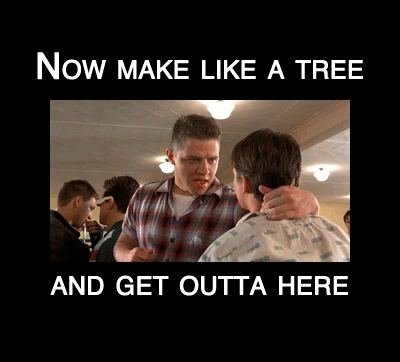
Retrieved from http://www.vancitybuzz.com/wp-content/uploads/2015/03/tumblr_lax4bqzBZu1qa54hvo1_400.gif on 9/11/2015.
Larry is a bit perplexed. As the holder of a valid License to Carry Firearms, it is perfectly legal for him to carry a concealed firearm. There is no Pennsylvania law generally prohibiting carry in grocery stores. He didn’t see any signs on the door. He wasn’t causing any trouble, he was minding his own business patronizing this business.
Does that mean Larry can tell Mr. Manager to “pound sand!”
No. If he remained after the request/order to leave that would make Larry a defiant trespasser. Even though the store is generally open to the public, Mr. Manager has given Larry notice that his license (his legal invitation to be on private property) is revoked and those carrying guns are not welcome. In other words, the store does not give LAGOs license or privilege to shop there while armed. If Larry stays there knowing he has no right to do so, he is trespassing.
The situation becomes sticky when Mr. Manager is so frightened of Larry’s gun that he immediately calls the police. Can Larry be charged as a trespasser even though nobody has asked him to leave?
In this particular situation, probably not.
Let’s take a look at the letter of the law for both Criminal Trespass and Defiant Trespass:
18 Pa.C.S. § 3503
Criminal trespass.
(a) Buildings and occupied structures.–
(1) A person commits an offense if, knowing that he is not licensed or privileged to do so, he:
(i) enters, gains entry by subterfuge or surreptitiously remains in any building or occupied structure or separately secured or occupied portion thereof
In Larry’s situation, he did not know that he was not licensed or privileged to enter. Like we said, he did not see a sign (if there even was a sign) and Mr. Manager has not asked him to leave.
Do business owners who post signage make license and privilege to enter contingent upon the customer leaving their firearms behind? Does a “No Gun” sign convey that message to the customer? If so, it seems there is an argument to be made that when a gun-owner sees a “No Gun” sign at the entrance of a business, he knows he is not licensed or privileged to enter the building with his gun. But it is certainly not clear cut.
Then we have defiant trespass:
Defiant trespasser.–
(1) A person commits an offense if, knowing that he is not licensed or privileged to do so, he enters or remains in any place as to which notice against trespass is given by:
(i) actual communication to the actor;
(ii) posting in a manner prescribed by law or reasonably likely to come to the attention of intruders;
. . .
Similarly, an argument can be made that a gun owner who overtly ignores a “No Gun” knows that he is not licensed or privileged to enter the premises. This particular law mentions signage. However, this seems to be aimed at signs giving “notice against trespass . . . reasonably likely to come to the attention of intruders.” “Notice against trespass” appears to be tailored toward signs that say things such as, well… “no trespassing.” “No trespassing” signs send the clear message that persons are not permitted in an area without permission. “No Gun” signs certainly send a clear message that the owner has a policy against firearms on the premises. Again, the question is whether the customer’s license or privilege to enter, and therefore ability to spend money, is contingent upon abiding by the policy. If so, is an armed customer an “intruder?” The law doesn’t define the term “intruder,” but if the gun owner enters despite direct notification of the policy, quite possibly.
The law also lists specific defenses.
(c) Defenses.–It is a defense to prosecution under this section that:
(1) a building or occupied structure involved in an offense under subsection (a) of this section was abandoned;
(2) the premises were at the time open to members of the public and the actor complied with all lawful conditions imposed on access to or remaining in the premises; or
(3) the actor reasonably believed that the owner of the premises, or other person empowered to license access thereto, would have licensed him to enter or remain.
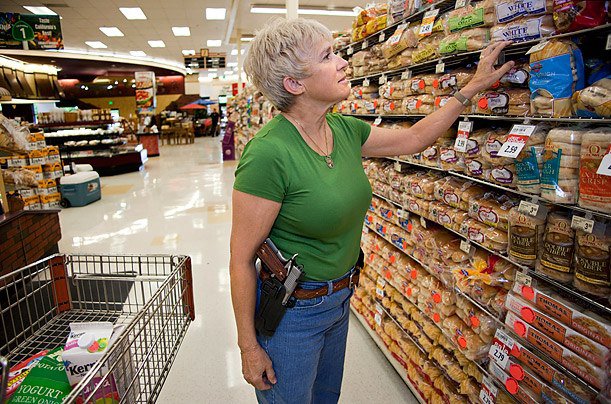
Retrieved from Oklahoma’s http://soonerpoll.com/tulsans-split-on-feeling-safe-1-year-later-on-open-carry/ on January 6, 2015.
The focus for a LAGO is on (c)(2). When we’re talking about places that are generally open for business, they are open to members of the public. But how does one comply with “all lawful conditions imposed on access?” Does that mean as long as one comes in through the customer’s entrance, rather than a private back door or broken window, that he qualifies for this defense? Or is being “gun-free” a condition on access? Is one’s entry contingent upon leaving their guns at home or in their car?
This is yet another tough question, to which there are no definitive answers in the developed case law in Pennsylvania. There is no case law specifically dealing with this issue, and there seems to be at least an articulable argument on either side.
The official comment to this law makes an effort to clarify:
The offense is limited to situations where the objective circumstances show an unwanted intrusion by the actor; not every entry on lands of another is a trespass. Neither the inadvertent trespasser nor the trespasser who reasonably believes that the owner would have licensed him to enter the premises will be penalized.
Perhaps an unsuspecting LAGO’s saving grace is the phrase “knowing that he is not licensed or privileged to do so.” As this is an element of the offense, the prosecutor (government) will have the burden to prove beyond a reasonable doubt that the LAGO customer saw the sign or otherwise knew about the anti-gun policy in place. This is a very high burden to meet. Unless a LAGO openly admits that he saw this sign, understood that it applied to him (as opposed to someone open carrying for example), and ignored the sign, this might prove extremely difficult. In Larry’s situation, this simply wasn’t the case. Larry didn’t see any sign, so we would hope that Larry would not admit to seeing one! But we have unfortunately dealt with numerous individuals who gave false confessions under the stress of certain situations. Remember to LAWYER UP & SHUT UP.
All in all, there is no case law that deals directly with trespass charges and “No Gun” signs. We have never even heard of anybody even being prosecuted in that context. But just because something has never happened before doesn’t necessarily mean it’s never going to happen. As it true when it comes to any area of the law that is not clearly settled, LAGOs should be aware all of the arguments that exist.
So should Penn LAGOs ignore “No Gun” signs? Certainly not. Should a Penn LAGO who is asked to leave because he or she has a gun and the owner of the business asks them to leave whip out his or her phone and video a confrontation with the owner and the police? We would strongly recommend against it as you will likely earn a citation. But will a LAGO who fails to notice one in an otherwise lawful location face prosecution? Though not impossible, it is unlikely.

